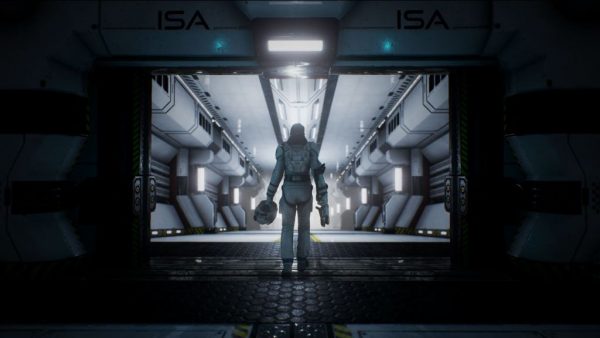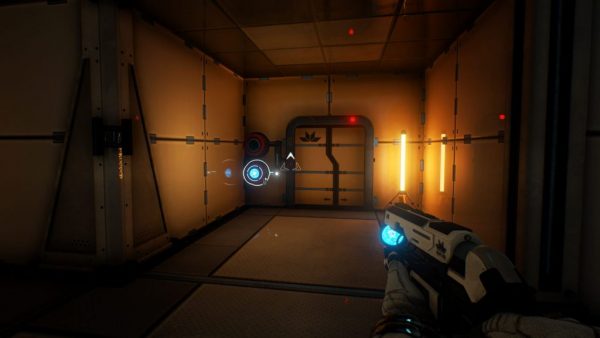Also On: Xbox One, PC
Publisher: Square Enix
Developer: Bulkhead Interactive
Medium: Digital
Players: 1
Online: No
ESRB: T
As much as I’d like to judge The Turing Test on its own terms, I don’t think that’s possible. It’s a Portal clone, and that’s evident on almost every aspect of the game. You play as a female character woken up in mysterious circumstances by an unseen robot. You move from room to room solving a series of puzzles, some involving cubes, all involving a specialized weapon/tool that looks like a gun but isn’t. Gradually you realize that the robot may not have your best interests at heart. The specifics of how it all unfolds may be a little different, but in broad terms, it’s hard to imagine any two games being more identical.
That’s not to say The Turing Test copied every aspect of Portal. Most notably, it lacks that game’s sense of humour. The Turing Test takes its sci-fi very seriously, and aims to be a meditation on what artificial intelligence really means. There are no sassy robots here; it’s just plot and philosophical discourse all the way.
Which, truth be told, probably isn’t the worst way to go about ripping off Portal. As far as I’m concerned, Portal 2 might be the funniest game I’ve ever played, so any attempt at copying that likely would’ve come off as a pale imitation. The makers of The Turing Test clearly recognized that, and set out to do their own thing. I can’t say that I’m as deeply invested in thinking about the nature of artificial intelligence as I was in…well, everything that went on with GLaDOS and Wheatley, but I appreciate that Bulkhead Interactive told their own story.
It’s just a shame that they didn’t take a similar approach to The Turing Test’s gameplay. As I said a few paragraphs ago, the extent to which this rips off Portal is astounding. Rather than having a portal gun, you have an “Energy Manipulation Tool” that closes and opens doors. The whole game takes place in a sterile, white facility, with reminders strewn about to hint at what may have come before you. You’re guided in your tasks by an unseen robot, who, while less malevolent than GLaDOS, still draws inspiration from the HAL 9000 school of robot-human interaction. Just about the only difference is that the puzzles here aren’t anywhere close to being as complex or difficult as they are in Portal — which, all things considered, is kind of a drawback.
Of course, there’s a huge difference between “not as good as Portal 2” and “not worth playing”, not least because there’s a good argument to be made that Portal 2 is the best game ever. Failing to live up to perfection is only failure in a very broad sense of the term, and The Turing Test hardly counts as a bad game. It won’t make you forget that elephant-sized game in the corner of the room by any means, but if you’re still wishing that, one way or another, GLaDOS and Chell could return, this probably counts as the closest you’re going to get.



